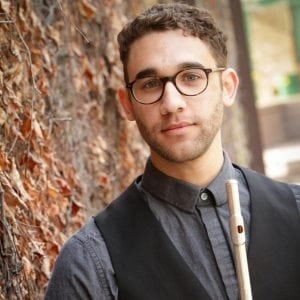By Anthony LaBat, Special to The Sybaritic Singer
How do you begin to talk about an artist like Alexis Ffrench? As someone new to his music, this only got more difficult as time went on, and that’s mostly 1) because I take days worth of notes before penning these, and 2) because there’s so much to share with you now and so little page.
Alexis Ffrench is a UK pianist and has been active in the recording industry since 2006. His newest album, Evolution, is his debut recording with Sony Music. The album boasts some outstanding collaborators in Dutch harpist Lavinia Meijer, a champion of Philip Glass’s music, and The City of Prague Philharmonic Orchestra. With the long-anticipated Evolution, Ffrench is able to blend elements of pop, R&B, folk, and classical music.
Right, getting into it…
Conventional and unconventional, there’s something for everyone on this record. “Reborn” is the first track on the album and a grand gesture if I’ve ever seen one. It involves a lot of moving parts in the orchestra and feature harp. “Exhale” is similar to this in that you can actually hear what a great musical partner he is. The way he’s so involved in the playing of others around him allows him to ebb and flow with them seamlessly. His background in classical music (a graduate of the prestigious Royal Academy of Music in London) is apparent here in that he knows how to set an orchestra so that it’s not so overpowering while still carrying some weight.
Where we start to see Ffrench’s skill as an orchestrator is in “Forgiven”. “Forgiven” is another cut like the above, featuring the whole orchestra, but in a much more involved way. Rather than having them accompany him, he really takes a moment to bring out the skills of their players. Harmonically, this is one of the more magnetic tracks on the album as well. City of Prague are a fantastic group of musicians and it’s always nice when a soloist can take a step back and let the group around them carry the music forward.
“Where Worlds Collide” has one of my least favorite…well, actually… one of my most favorite devices in music: the insta-modulation. If you’re wondering where we got this, it’s from R&B (S.O. to Michael, Whitney, and everyone else who’s outgrown the use of their last name). Granted it might not be an actual term, but there are no rules in musical vernacular…. No other art form has truly mastered the insta-modulation with immediacy in the way R&B has, arguably not even classical, and yet HERE IT IS in Evolution.
Probably one of the most refreshing moments in the album is on “Waiting to breathe”. Here we get a taste of a completely different genre as Alexis sets piano and orchestra within a folk vibe. All of a sudden string bass, fiddle, and the soft tap of fingertips on the headboard we’re so familiar with in Americana and bluegrass bubble to the surface.
I like to immerse myself in music that might not be my natural inclination. — Ffrench
As I said before, Ffrench is definitely new to me, and in engaging with him I found the music to be above all else inviting, welcoming. It’s outward-looking and he doesn’t seem to be phased at all at the task he has set before himself.
This leads me to perhaps my favorite thing about Alexis Ffrench, which is that he is an artist that is dead-set on challenging the way classical music is. You couldn’t call this album a classical album, but really you couldn’t not call it that either. You couldn’t really call it much of anything except Evolution.
In his bio, he reflects on a night watching the BBC Proms, looking out into the audience, and noticing a lack of diversity in the audience. As he was watching this, an announcer on the program remarks “Who says classical music is dead?” to which Alexis replies: “There is no room for complacency in this regard.”
Where classical music is concerned, we still have a major job to do in removing perceived barriers. It’s incredibly important to me, and I feel we all have a duty to speak out and encourage positive change. — Ffrench
He makes pointed and accurate statements about classical music culture as it is a profession that is predominantly white. Even when programming concerts of diverse music, where composers are not necessarily all white, that music is still often curated, performed, and patronized by white people. Considering all of the styles he has brought into this album, Ffrench is asking classical music to take a step out of where it is and tread new ground.
It’s going to be a huge album in terms of its broad appeal and the way it crosses over all genres to reach all audiences. In the near future, I would love to look out at Last Night of the Proms and see a welcome mixture of white, brown and black faces, with people of all backgrounds. That would prove to me that classical music is alive and adaptable and I see myself as an artist who can help to lead the change. — Ffrench
Evolution represents Ffrench’s latest and arguably his most direct step yet towards achieving this goal, and so we have to wonder how much further this album takes us towards that. Musically, he takes significant steps towards integrating pop, R&B, and classical elements, but this is confined to the harmony and melodic aspects of each track. I’m left wanting so much more in terms of the types of rhythmic styles that represent these genres of music. I feel as if the album is firmly rooted in the stylistic traditions of the western classical orchestra and popular idioms. The instrumentation is incredibly conventional in this sense, and we hear little deviation from the piano-orchestra dichotomy that saturates the album. I think more diversity in this sense would achieve an electric relationship between what we know and what we can imagine a musical divergence like this could be, and especially how those sounds could change our perspective on classical music.
Alexis Ffrench is a listener above all else, and it will be interesting to see what new sounds he incorporates into his music as it continues to develop. He is a researcher and an artist, so anything could happen.
 Anthony LaBat is a flutist, writer, and archivist working out of Kansas City, Missouri. A devout fan of the weird and “going down that rabbit hole”, he is also tragically obsessed with details and their context. Anthony serves as Production Coordinator and flutist for newEar Contemporary Ensemble, and sees music making as an act of community engagement. In writing, artists can empower each other through meaningful dialogue and criticism. Through meaningful dialogue and criticism, artists have limitless opportunities to widen perspectives, welcome new ones, and help each other create art that engages the whole of our community.
Anthony LaBat is a flutist, writer, and archivist working out of Kansas City, Missouri. A devout fan of the weird and “going down that rabbit hole”, he is also tragically obsessed with details and their context. Anthony serves as Production Coordinator and flutist for newEar Contemporary Ensemble, and sees music making as an act of community engagement. In writing, artists can empower each other through meaningful dialogue and criticism. Through meaningful dialogue and criticism, artists have limitless opportunities to widen perspectives, welcome new ones, and help each other create art that engages the whole of our community.

